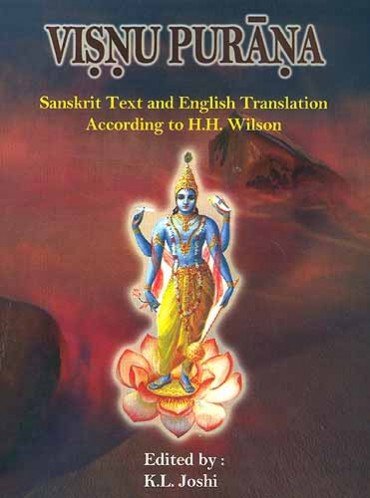The Vishnu Purana
by Horace Hayman Wilson | 1840 | 287,946 words | ISBN-10: 8171102127
The English translation of the Vishnu Purana. This is a primary sacred text of the Vaishnava branch of Hinduism. It is one of the eighteen greater Puranas, a branch of sacred Vedic literature which was first committed to writing during the first millennium of the common era. Like most of the other Puranas, this is a complete narrative from the cr...
Chapter XVI - Inquiries of Maitreya respecting the history of Prahlada
Maitreya said:—
Venerable Muni, you have described to me the races of human beings, and the eternal Viṣṇu, the cause of this world; but who was this mighty Prahlāda, of whom you have last spoken; whom fire could not burn; who died not, when pierced by weapons; at whose presence in the waters earth trembled, shaken by his movements, even though in bonds; and who, overwhelmed with rocks, remained unhurt. I am desirous to hear an account of the unequalled might of that sage worshipper of Viṣṇu, to whose marvellous history you have alluded. Why was he assailed by the weapons of the sons of Diti? why was so righteous a person thrown into the sea? wherefore was he overwhelmed with rocks? why bitten by venomous snakes? why hurled from the mountain crest? why cast into the flames? why was he made a mark for the tusks of the elephants of the spheres? wherefore was the blast of death directed against him by the enemies of the gods? why did the priests of the Daityas practise ceremonies for his destruction? why were the thousand illusions of Samvara exercised upon him? and for what purpose was deadly poison administered to him by the servants of the king, but which was innocuous as food to his sagacious son? All this I am anxious to hear: the history of the magnanimous Prahlāda; a legend of great marvels. Not that it is a wonder that he should have been uninjured by the Daityas; for who can injure the man that fixes his whole heart on Viṣṇu? but it is strange that such inveterate hatred should have been shewn, by his own kin, to one so virtuous, so unweariedly occupied in worshipping Viṣṇu. You can explain to me for what reason the sons of Diti offered violence to one so pious, so illustrious, so attached to Viṣṇu, so free from guile. Generous enemies wage no war with such as he was, full of sanctity and every excellence; how should his own father thus behave towards him? Tell me therefore, most illustrious Muni, the whole story in detail: I wish to hear the entire narrative of the sovereign of the Daitya race.
